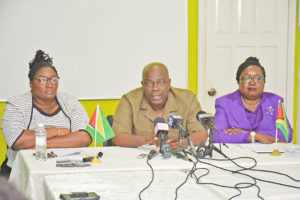
…GECOM’s CEO says as LGE draws closer
The Guyana Elections Commission (GECOM) is denying suggestions that it is behind schedule in its preparation for Local Government Elections.
It has noted that, on the contrary, ballot boxes are under Police guard and are ready to be set up ahead of disciplined services ranks (D Day) voting.
The GECOM position was articulated by Chief Elections Officer Keith Lowenfield at a press conference on Monday. He explained that GECOM would be prepositioning the ballot boxes at locations around the country to aid in ease of movement for November 2, when Police, army and fire service ranks would turn out to vote early.
This includes prepositioning ballot boxes at locations in E Division, which would cater to ranks in Mackenzie, Wismar, Mabura, Ituni and Kwakwani. Boxes will also be prepositioned in places like Bartica, to cater for guards from the Mazaruni prison to vote.
“Going westward, we will be prepositioning ballots for ranks at Leguan, because ranks at Leguan and Sans Souci will be voting at Leguan. And going further west, in G Division, we will be prepositioning (boxes) at Anna Regina to take care of the ranks,” Lowenfield said.
“We’ll be going as far west as St Mary’s Police station up the Essequibo River. So while D-Day is intended to be on the second, we are prepositioning for the ease of movement on D-Day, so that the inordinate time associated with movement will be minimised,” Lowenfield explained.
He noted that preparations for the disciplined services to vote are well advanced. In addition, Lowenfield reported that he had held meetings with stakeholders earlier on Monday. He revealed that he has also advised them on the process for nominating agents and scrutineers.
A total of 10,700 polling day staff has been trained. Lowenfield noted that they would be employed and carry out mock polls as practise. And in light of concerns about the time it would take to tabulate results, the CEO assured that results should be provided in 24 hours.
But when it comes to polling stations, Lowenfield revealed that GECOM has 1,674 polling stations. He noted that private residences would also be used as polling stations. In fact, there are some 272 of those.
Lowenfield explained that the Commission had invited comments from the commissioners on the suitability of the residences, but, for some time, none has been forthcoming.
“At the level of the commission, I did indicate the areas they are located and asked if there are any comments, meaning negative comments. I have not received any negatives, so we’re moving to confirm those locations,” he explained.
“The posting of polls: we have started, and that will be completed on November 2; so all electors will know, approximately 10 days prior to elections, the locations they will be voting. So the exercise has started. In my engagement this morning with political stakeholders, they indicated they do have some concerns, and I advised that they provide those details by the end of today,” Lowenfield indicated.
Meanwhile, Deputy CEO Roxanne Myers related that the time period within which persons can apply to vote by proxy has begun, and would last until November 2. She noted that application forms for proxy voters will be issued on November 8.
LGE
LGE will be held in all municipalities and Neighbourhood Democratic Councils (NDCs) in Guyana using a mixed electoral system of Proportional Representation (PR) and First Past the Post (FPTP).
The PR electoral system is one in which parties’ gain seats in proportion to the number of votes cast for them in a municipality or NDC. For someone to be elected under the Proportional Representation system, they must be on a party list or voluntary group list. Individuals cannot contest in the PR system.
The FPTP system has been explained as one in which an individual gains control by the number of votes cast for him or her. These candidates can come from a party, voluntary group, or as independent contestants.
Fifty per cent of councillors for each municipality and NDC are elected through the Proportional Representation component, while the other half comes from FPTP component of the electoral system.
Under the FPTP system, an individual candidate can contest for only one seat in a single constituency in which he or she is registered and resides. Candidates can only be nominated for one group for the PR and FPTP list.



